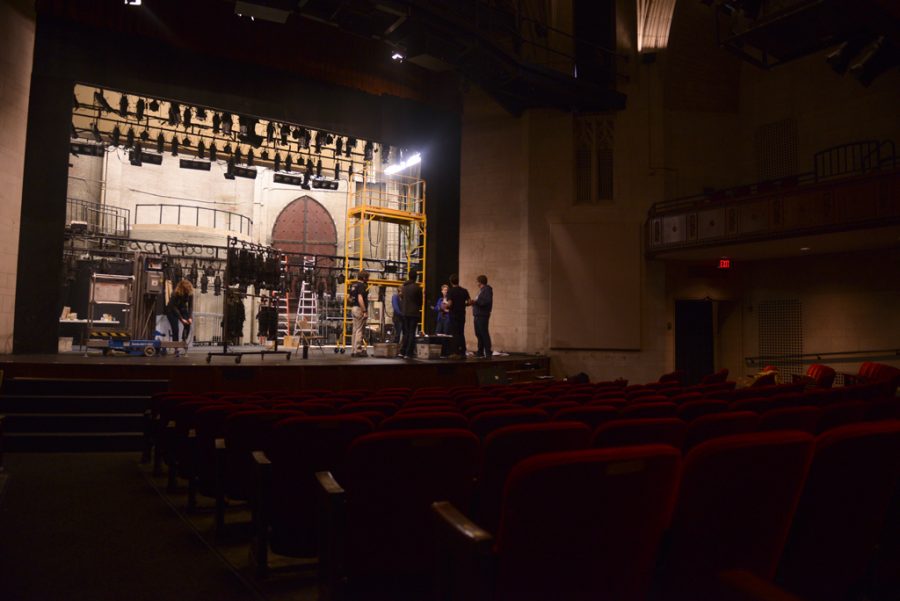As the entire cast of Pitt Stages’ “Hair” strips naked under low blue stage lights upstage, a hippie mulling over his Vietnam draft card downstage sings, “Where is the something? Where is the someone that tells me why I live and die?”
This is “Hair’s” most iconic scene and is no less iconic, or shocking, in a college production. This is, after all, the same interracial New York play that defined “rock musicals” for decades after its opening, most recently with a 2009 Broadway revival. The cast, noting the show’s significance renewed after the results of the 2016 election on Tuesday, offered a free show last Wednesday, a day earlier than previously scheduled and doled out hugs in costume outside the Cathedral.
The University theater department’s production of the show runs until Nov. 20 at the Charity Randall Theater with showtimes from Wednesday to Saturday at 8 p.m. and a Sunday matinee at 2 p.m.
“Hair” follows the “tribe,” a band of hippies in the late ’60s Big Apple who preach freedom, peace, love and drugs. The audience meets Berger (Matt Keefer) first, a free spirit who takes off his jeans and asks an audience member to hold onto them after the first song. There’s Sheila (Sarah Fling), a political activist, and Woof (Davis Weaver), an odd soul who “grows things” and is obsessed with Mick Jagger. Woof says he’s not gay — though his flirting with Berger suggest otherwise to the rest of the tribe.
As the tribe takes turns, introducing each other through song, we meet Hud (Harry Hawkins IV), a black militant who declares himself the “President of the United States of Love,” and pregnant Jeanie (Julia de Avilez Rocha), who was knocked up by a “speed freak” but wishes it was by another member of the tribe, Claude. Claude (Dan Mayhak, who has a voice like Hozier) is a New Yorker so stoned he thinks he’s from Manchester, England, and fights with himself and the rest of the tribe about his draft application, providing the only thread of story to this trippy, character-driven musical.
Two weeks ago, this all would have felt like gentle liberal reminders of social justice. It was always relevant, though — Elizabeth Coen, a visiting assistant theater arts professor, even published a Medium post with interviews from people detailing their reactions to the events of the late ’60s and the play itself.
But today, it feels like a necessary push, a call to action of what to do in a world that seems like it doesn’t make sense, in a country that you thought you knew. “Hair” reminds us that sometimes the only way to fight a world made of nonsense is with a different type of nonsense — one born of love and pleasure instead of hate and fear.
It’s hard to watch “Hair” without thinking of the present day. When Jeanie shouts “Anybody who says pot is bad is full of sh*t,” you remember that eight states have now legalized recreational marijuana. In the slow, poetic “Dead End,” a song about being black in America, Hud falls backward off a chair, hands up, into the arms of the ensemble, reminiscent of every victim in that same scenario since Trayvon Martin in 2012.
All this nudging builds to the finale when the cast joins hands, singing “Let the Sun Shine In,” a symphonic flower child anthem of hope. During the song, there’s a projection of images from the present: young black men with hands up, police lights shining off their faces, as well as protesters hoisting signs that read, “REAL MEN DON’T RAPE” and “REFUGEES WELCOME, RACISTS GO HOME,” fully realizing the timelessness of “Hair.”
Before curtain, hippies in ’60s era garb spring about the theater barefoot, asking each other, “Who has the joints?” setting the “peace and love” tone as soon as you find your seat. Even during the intermission, cast members arm themselves with an acoustic guitar and a drum pad, playing simple tunes up on stage, including an appropriate cover of The Zombies’ “Time of the Season.” The play starts abruptly, as actors storm the stage and jump into the full-throated bohemian ballad “Aquarius.”
The theater department’s intense production plans paid off, with the front half of a bus sticking out into the middle of the stage and gridiron columns traced with vines anchoring the set. The rest of the show’s effects rely on video projections, especially in the groovy “Walking in Space.” The tribe gets high, and the stage itself turns into a magnificent lava lamp, painting the whole room in a host of trippy colors, the stage shining with orange, red and blue.
“Hair” also carries simple, compelling images, such as Jeanie emerging from the stage floor wearing a gas mask and the play’s aforementioned nude scene.
When anthropologist Margaret Mead (always-energetic Ben McClymont) interrupts the tribe to study their way of life, she leaves touched by their philosophy. Mead, a role that’s typically played by men in drag, then turns to the audience and breaks the fourth wall.
“I wish every mother and father in this theater would go home tonight and make a speech to their teenagers and say, ‘Kids — be free, no guilt. Be whoever you are, do whatever you want to do. Just as long as you don’t hurt anybody, right?”
If Mead had delivered those words a week before, it still would’ve resonated with the audience but maybe only for the drive home. At this moment in time, though, hopefully they have the power to stay with you for at least four years.


